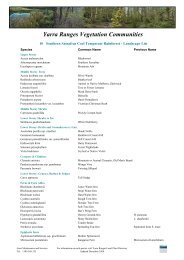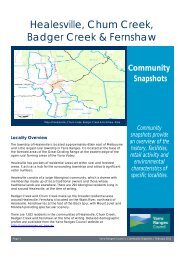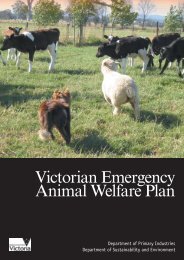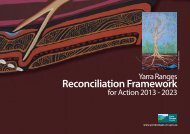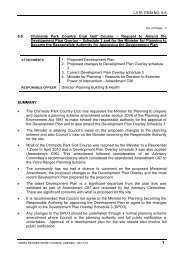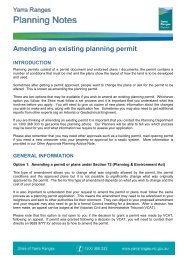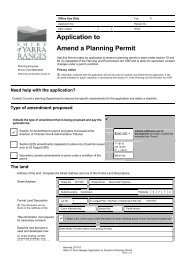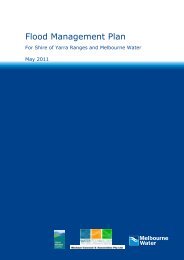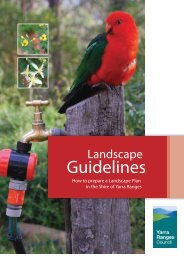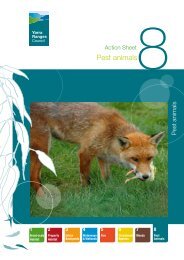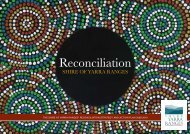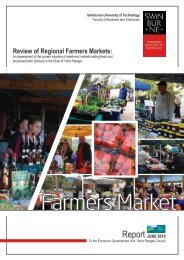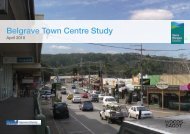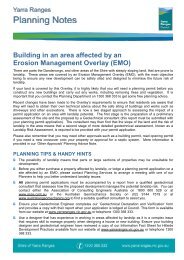HERE - Shire of Yarra Ranges - Vic.gov.au
HERE - Shire of Yarra Ranges - Vic.gov.au
HERE - Shire of Yarra Ranges - Vic.gov.au
Create successful ePaper yourself
Turn your PDF publications into a flip-book with our unique Google optimized e-Paper software.
WORKSHOP KEY LEARNINGSBREAKOUT SESSION 1:11am – 12.10pmWorkshop title Presenter(s) Workshop description Key LearningsFightingExtinctionSchoolsMiranda Wills– HealesvilleSanctuarySusan Birch –MacclesfieldPrimary SchoolIn 2014 schools are invited to partner withHealesville Sanctuary to Fight Extinction.Your students will learn about their localendangered species and develop 2 or 3 waysto raise awareness about this animal in yourcommunity and beyond. Be creative! You canengage with the community in a wide variety<strong>of</strong> ways – it’s up to you! Why would you dothis?1. Your students will have the ability to makea genuine difference.2. Wildlife projects are highly engaging andcan achieve learning outcomes across thecurriculum.3. Your students will get to participate in anonline web conference with zoo expertsHow Macclesfield Primary School have taken thisknowledge and made it ongoingGreat opportunity for schools to take up the challengein 2014Wipe for Wildlife: Mt Evelyn Primary School – knows agood supplier for sustainable toilet paper at anaffordable priceZoo’s <strong>Vic</strong>toria / Healesville Sanctuary run the program,www.zoo.org.<strong>au</strong>/education/schools-fighting-extinctionConcentrate energies on 18 <strong>of</strong> the local <strong>Vic</strong>torianspecies under threatTicks a lot <strong>of</strong> boxes for biodiversity & correlates with alot <strong>of</strong> school curriculumYATZ Program (‘Youth At The Zoo’)www.zoo.org.<strong>au</strong>/yatz
4. You have the chance to receive a greatprize and to be pr<strong>of</strong>iled on our websitehttp://www.actwild.org.<strong>au</strong>/wildschools/In 2013 a number <strong>of</strong> schools participatedincluding Macclesfield Primary. TeacherSusan Birch and her students will share theirjourney to help save Leadbeater's Possum.During this interactive workshop you will havea chance to learn what other schools havedone, ask questions, brainstorm ideas andfind out what resources Zoos <strong>Vic</strong>toria can<strong>of</strong>fer. This project addresses a range <strong>of</strong>cross-curriculum priorities from level 5 tolevel 8 <strong>of</strong> AusVELS. As a minimum you willbe addressing standards in the domains <strong>of</strong>:Civics and Citizenship, InterpersonalLearning, Science, English, Arts, Humanities,Science, Mathematics, Communication,Thinking Processes and Design, Creativityand Technology.‘Act Wild’ AppOrganics atSchoolAngela Gi<strong>of</strong>fre-OrganicEmpireColleen Peele- BelgraveHeightsChristianSchoolThis hands-on workshop will tell the story <strong>of</strong>how local teachers and organic businesseswork together to enhance classroom learningby growing and eating organic food.Organic School Garden Program providedby the BFA (Biological Farmers Association)– a free program available to schoolsAustralia- wide with lots <strong>of</strong> easy to use ideasand lessons. Come and find out how you canuse the current lessons available on line.Take a look at the digital story created byBelgrave Heights students.Kids Teaching Kids – an education modelthat uses local environmental issues as atheme for learning. Kids Teaching Kids startsOrganic schools website: www.organicschools.com.<strong>au</strong>(availability <strong>of</strong> curriculum)Organic Empire website: www.organicempire.com.<strong>au</strong>Have a go – get startedEasy to make food out <strong>of</strong> things you growAssociation between growing your own & healthyeatingMaking community links, eg. Organic EmpireCouncil community gardenLetting kids take initiativeReframing: poo = treasure, fire in your throat = eatingrocket Sustainable living & caring for yourself, your health –physically and emotionally
in the classroom and extends into thecommunity through the Kids Teaching KidsLearning Model and Program. Come alongand find out how Belgrave Heights tappedinto this amazing resource, learning aboutfood miles, GM Foods and raising free-rangechickens.Association & experience with ‘fresh’ food & earth (soil)Wurrundjeri &Waterbugs atWoori YallockPeter Preuss -Woori FarmSchoolKaren Garth -Eco-AdventureToursTwo environmental educators in the <strong>Yarra</strong>Valley have combined to <strong>of</strong>fer programmes atthe Woori Yallock Farm School. The FarmSchool won the <strong>Shire</strong> <strong>of</strong> <strong>Yarra</strong> <strong>Ranges</strong>’Habitat Schools Award in 2012. It has a‘Reconciliation Garden’ and a range <strong>of</strong>curriculum materials and activities, whichaddress the National Curriculumrequirements for Aboriginal Culture. Theseresources can be shared, and after a visit tothe Farm School, teachers could instigatesimilar projects at their own schools.There is also a vegie patch, dam and naturewalk which Eco-Adventure Tours uses toexplore issues including sustainability, “foodmiles”, and how water bugs can indicate thehealth <strong>of</strong> a water body. Sessions can also berun in conjunction with a visit to theL<strong>au</strong>nching Place Sewage Treatment Plan,covering aspects <strong>of</strong> Chemistry, Science andGeography Units.Participants will be given an overview <strong>of</strong> theprogrammes <strong>of</strong>fered, and take part in handson activities to identify water bugs and learnabout some indigenous plants.Great resources at Woori Yallock Farm SchoolUse <strong>of</strong> indigenous plants – food, medicinal, etcWaterbug & plant ID activities so easy to do asactivities in the classroomDon’t be overwhelmed in starting to teach aboutindigenous culturePeter is a wealth <strong>of</strong> informationKaren @ Eco Adventure Tours – <strong>of</strong>fering tours locallyon waterbugs, catchment management, etc at BadgerWeir, Silvan Reservoir, Cardinia Reservoir, MaroondahReservoir, www.ecoadventuretours.com.<strong>au</strong>What is theTransition TownJane Monk -TransitionAn interactive workshop to assist teachersand students with tools and ideas toContact for TT – people from TT willing to speak toschools, extra resource
Initiative? Howcan schools bepart <strong>of</strong> thetransition toresilient andsustainablecommunities?TownMaroondahunderstand the role they play in creating aresilient and sustainable future. Thisworkshop will have participants experienceexercises that will inform, inspire andencourage discussion and action based onthe global transition initiative.Can start small – with self in own space and filters outStarting now is vital. Every step countsTT provides a framework for transition and provides apositive approach to the problemGood exercise to do with studentsProvides a different learning model and purpose foreducation – to look after the world.Provides a space for positive visionYoung people as tomorrow’s leaders – important topromote this as it will take time to becomePhysical environment – needs to reflect future visionwww.transitionnetwork.org/Building a wholeschool approachto sustainabilitywithResourceSmartAuSSI <strong>Vic</strong>Ally Borgelt +Kirsty Costa -CERESEnvironmentParkMatt Henry -MooroolbarkEast PrimarySchoolResourceSmart AuSSI <strong>Vic</strong> is a frameworkthat helps guide schools to develop a ‘wholeschool approach’ to sustainability. Itintegrates educational, environmental, socialand economic outcomes so that schools donot work with each area in isolation but ascomponents <strong>of</strong> the bigger picture <strong>of</strong>sustainability.ResourceSmart AuSSI <strong>Vic</strong> helps schools tominimise waste, save energy and water,improve biodiversity in their school grounds,and cut their greenhouse gas emmissions.Find out how to become a ResourceSmartAuSSI <strong>Vic</strong> school, the support available foryour school, and tips on how to create asustainability buzz around your school. Gainan insight from the beginning schoolperspective - first steps, resources, studentgreen teams and traps – with a case study byMooroolbark East Primary School. Help available if you need – look websites, CERES,councils Start SMALL Greatest weapon – KIDS! Creating a whole school approach – use parents –connect with community There are steps set out Its achievable http://sustainability.ceres.org.<strong>au</strong>/welcome/
BREAKOUT SESSION 2:12.10pm – 1.20pmInspire + enable:the secret forcommunicatingchangeLes Robinson -EnablingChangeLes reveals the surprising formula for brilliant,inspiring communications. No matter what thesubject, a simple formula equips you to reachpeople's hearts and lower their fears <strong>of</strong>change. This is something you can use nomatter who you are communicating with -principals, teachers, parents, or members <strong>of</strong>the wider community.Four steps:o Identify the action clearlyo Inspiring actiono Answering fearso Specific invitationwww.enablingchange.com.<strong>au</strong>Dopamine is not released in our brains by logicDon’t push your views onto othersPersonal stories are far more powerful than factsMake it funInvitation to act:1. Identify the action2. Identify one person’s inspiring story3. List, then pre-empt likely fears, anxieties,doubts4. The clear, simple, specific requestBuildingSustainableSchool –CommunityPartnershipsRobbie JoseGuevara –RMITSimonWoodland -<strong>Yarra</strong> <strong>Ranges</strong>CouncilMichelleRaynor - ThePatch PrimarySchoolAll this sustainability stuff can be hard work!No mere mortal can do it alone. Michelle,Robbie and Simon have just returned fromJapan where they shared their learnings withpeers from across the Asia Pacific region.How can the broader community supportsustainable schools? What makes a goodpartnership work for everyone? We’ll wrestlewith these questions, tell inspiring stories,and concoct a recipe for success that youcan take home to try for yourself.Showing your partners what’s in it for themYou never know what’s possible until you askTapping into resources through the parentsGiving a project timeThe power <strong>of</strong> oneIntegration into the curriculumDon’t be afraid <strong>of</strong> the unknownInvolve your students – give them ownershipThink outside the box re-project partnersPower <strong>of</strong> school communities – finance and expertiseGetting started: Ateachers guide tobeginning thewaste reductionDaena Hailey -Rolling HillsPrimary SchoolAntoniaThis workshop will provide teachers withpractical information on starting the wastereduction journey at their school. We willcover how to do a school waste <strong>au</strong>dit andTimeline activity – time taken for items to breakdown inlandfill is a good classroom activityRelay with recycling is a good activity‘Red Group’ <strong>of</strong>fer s<strong>of</strong>t plastics recycling in schools
journey Heward -EnviroComAustraliaInspiring studentsto create nativehabitatsAnn Gaschk -Oxley ChristianCollegeAnthony Mann– <strong>Yarra</strong><strong>Ranges</strong>Councillinking school waste <strong>au</strong>diting to the nationalcurriculum. A case study from Rolling HillsPrimary School will provide teachers withactions they can implement right now toreduce waste at school.Attendees note; be ready to get your handsdirty!Ann will explain why we created habitats andwhat made them successful. I will discussdifficulties encountered and reassureteachers <strong>of</strong> supporting resources. I willhighlight methods <strong>of</strong> creating enthusiasm andpassion within the students, forenvironmental topics. The students at OxleyChristian College are highly motivated tocreate native habitats at school. They havebeen delighted to see an increase in nativeanimals visiting and residing at the school.Some <strong>of</strong> the student initiatives includeconstruction <strong>of</strong> a butterfly garden, froghabitat, interactive garden and nesting boxes.Our most exciting construction is the habitatcorridor that connects Brushy Creek to ourenvironment precinct. So far we have planted1800 indigenous plants into that habitat.This workshop will also explore how you canundertake the HabitAT Census in your schooland how to develop a plan for enhancingyour school’s habitat value. The census is aStart a waste management policy at schoolDo a waste <strong>au</strong>dit – data able to be used in class andprovides info on future waste minimisationWaste trophy – great idea... for class creating leastwaste for a week‘Captain Sustainability’ student (dressed up) presentstrophy at assemblyPlanet Ark – free signage for binsCheck with Council about what’s recyclable in yourarea and what other resources they <strong>of</strong>fer and cansuggest Availability <strong>of</strong> habitat census Bush tucker garden – Peter as a resource Logs as habitat Engaging students in whole process – ownership Not to be discouraged by lack <strong>of</strong> large trees Small areas <strong>of</strong> vegetation are also important 2km radius <strong>of</strong> each school – very important to connectwith other schools Census – plan – action (providing a framework)http://www.yarraranges.vic.<strong>gov</strong>.<strong>au</strong>/lfs/LfS_Resources/HabitAT_School_Census Aerial images as an awareness-raising tool
cross curricula program which incorporatesScience, Maths, and Geography skills andcan include some History and English skillsas well.AuSSI <strong>Vic</strong> - thenext stepsSimon Hum -Sustainability<strong>Vic</strong>toriaTrish Rathmell- Mount EvelynPrimary SchoolLEADERSHIP SCHOOLS – 4Star andBeyond!This session focuses on what it takes to getto 4Star and beyond in the ResourceSmartAuSSI <strong>Vic</strong> framework. What is your schooldoing? What has it done and what are thepossibilities that are out there for leadership?The session will be a mixture <strong>of</strong> information,discussion and planning on how your schoolcan continue its journey. SV will present onthe process <strong>of</strong> progressing to 4 and 5 Starand what schools can do to keep up themomentum built up. Trish Rathmell fromMount Evelyn PS (a 5Star school) will look attheir journey and how they are maintainingtheir energy and commitment to sustainabilityleadership.Even if you haven’t started your schoolsjourney on ResourceSmart AuSSI <strong>Vic</strong> here isyour chance to hear what others have doneand be inspired by the endless opportunitiesthat your school can take on.Leadership – the discussionHow do we make it easier?Who do we connect with?What value do they add?BREAKOUT SESSION 3:2.20pm – 2.50pmThe art <strong>of</strong> flipping Les Robinson -EnablingChange"Solution frames" give better results than"problem frames". The way we framediscussions can either disable or enable ourstudents, our schools and ourselves. Lesshares some "radical positivist" ideas toThink about the solution, not the problemSome solutions are simpleTake a risk & do somethingBe comfortable with unfamiliarVolunteering is not just for the retired
enable imagination to flourish. Teach kids about solutions first and problems secondIncorporatingsustainabilitylessons ideasacross thecurriculumKarolineWalter - VAEEThe VAEE and Oh My Garbage!This short and snappy session will draw fromthe Oh My Garbage! Resource to showexamples <strong>of</strong> how to incorporate sustainabilitylessons ideas across the curriculum.Participants will engage with a FUN way <strong>of</strong>getting students and teachers to think freshabout action in their school.Sustainability can be covered across all year levels andareasMake it funMaking it relevant to child’s social level, eg, mobilephone recycling for year 9‘Pashion Mashing’ – Les Robinson – combining otherareas with sustainabilitywww.vaee.vic.edu.<strong>au</strong>/Earth Education –an alternative way<strong>of</strong> engagingstudentsSimonWoodland –<strong>Yarra</strong> <strong>Ranges</strong>CouncilWe <strong>of</strong>ten focus on helping our students tounderstand environmental issues, but is itworking? Advocates <strong>of</strong> Earth Educationwould argue that there is a better way –focussing on fundamental ecologicalprincipals and positive experiences. Thisworkshop will explore the merits and results<strong>of</strong> this approach and get you thinking. Isthere a better way to help students takeeffective action for their future?Out <strong>of</strong> this worldStory is lead by the heartIs issue-based approach the best?Earth education suggests a focus on: energy flow,change, inter-relationships, cyclingIndividual/personalised perspectiveImportance <strong>of</strong> ‘me’ within social/ecological structureThe SchoolsWater EfficiencyProgram -Supporting<strong>Vic</strong>torian SchoolsAndrewHinchcliffe &Abbie Allen –SWEPThe Schools Water Efficiency Program(SWEP) is a <strong>gov</strong>ernment funded initiativeproviding schools with access to up to tw<strong>of</strong>ree data loggers per school campus for thepurpose <strong>of</strong> leak detection and continuing theeducation and demonstration <strong>of</strong> waterefficiency in practice. SWEP also providesaccess to an interactive website containingthe schools data which is complimented by aspecifically designed curriculum resource.Case studies reveal that continuedmonitoring by schools that used data loggingtechnology to educate and inform studentsachieved significant and sustained reductionsWebsite – very visual – good for different range <strong>of</strong>students www.myswep.com.<strong>au</strong>Data useful across school curriculumGood awareness raising tool and promotion <strong>of</strong> schoolssustainability actionsWeb based monitoring and alerts enable program topay for itself via water savingsGreat tool for maths teachers to integrate sustainabilityinto their curriculum
in water consumption. During this workshopyou’ll be shown how the data loggers,website and curriculum materials can assistyour school to identify f<strong>au</strong>lty devices or leaksas well as increase awareness on theschools water use.Active TravelPlanning at ParkOrchards PrimarySchoolRalph Geerling- ManninghamCouncilMelinda Frost& BrionyBarclay - ParkOrchardsPrimary SchoolActive TravelCommitteeThis workshop will provide a basic overview<strong>of</strong> the active travel planning process forschools, along with a case study <strong>of</strong> activetravel from Park Orchards Primary School.The workshop will include an activity tooutline some key considerations during theplanning process.Community TogetherProcess – aligning with schoolso Travel Datao Focus Groupso Strategic Planningo L<strong>au</strong>nchPrincipal SupportBREAKOUT SESSION 4:2.55pm – 3.25pmInnovationthinkingLes Robinson –EnablingChangeLes reveals a delightfully fun and simpletechnique to allow groups to innovatewonderfully creative solutions to almost anychallenge. Use it to revitalise a staff meeting, aschool program, or a teaching session. If not then what? Who, what, where, when, why? Take the ‘no’ out <strong>of</strong> it then it opens up possibilities Creating fast proto-types One great idea can come from a key innovation Positive method for brain-storming There’s no wrong answers Video ‘if not, then what’ on homepagewww.enablingchange.com.<strong>au</strong>Make it yourstudentsbusiness to helpthe environmentHoward Elston- KingswoodCollege JuniorSchoolIt can be challenging to provide students withthe positive attitude, knowledge and skillsrequired to make a difference in combatingclimate change. One way is to embed theseobjectives into a challenging, open-endedDevelops leadership qualitiesDiscovery learningSharing skills between studentsSolutions based approachEmpowering students
classroom activity based on a business model.Student teams form small businesses that areresponsible for determining how to addressspecific sustainable living issues. Year 5&6students set up businesses in energy (PowerSavers), waste reduction (3RInc.) and food(Bunches & Munches). Students respondedenthusiastically to the idea <strong>of</strong> making adifference at school and the freedom <strong>of</strong> settingtheir own goals. Teams created missionstatements, brainstormed ideas, documentedplans, identified resources and <strong>au</strong>dited theiractions. Support was provided whenever thestudents reached an impasse. It is hoped thatany gains made at school will be transferred totheir families. The presentation will show howthis student-centred, action-based approachcan be used at other schools.Developing a range <strong>of</strong> skills – real life learning:planning, <strong>au</strong>diting, problem solvingCool ResourcesThea Nicholas& JasonKimberley -Cool AustraliaDon't just teach - inspire!Include sustainability in your teaching withThea Nicholas. An immersive and interactivesession exploring how you can integratesustainability in Primary and Secondaryclassrooms. Learn about the FREE, AustralianCurriculum aligned, quality resources,programs and events coordinated by CoolAustralia that are essential for any beginningteacher and see how well you rank in theamazing Resource Race.Free resources – join up, http://cool<strong>au</strong>stralia.org/The kids want thisDon’t be overwhelmed/get burned outTake steps to sustain yourselfYou are encouraged to bring yourlaptops/devices to use during this session.Sticks and Dirt -an introductionJoey Boothby -ManninghamNature play has become a term used todescribe the creation <strong>of</strong> simple playExcursion awareness – no rules – allow explorationPlay has to be planned (once was the norm)
to nature playCouncil &WestgarthBush Kinderopportunities in the natural environment.These encourage children and parents to seethe natural environment as a place withlimitless options to play, imagine, relax andexplore.Research has shown that spending time innature improves physical and mentalwellbeing, reduces stress, promotes creativityand is a welcome alternative to a fast pacedtechnologically focused world.The detrimental effects <strong>of</strong> this trend are nowdocumented in rising obesity rates and longertermhealth, wellbeing and potentially a feeling<strong>of</strong> disconnection from the natural environment.This presentation will explore ways thatschools, <strong>gov</strong>ernment and communityorganisations can influence this trend andencourage children to play in natural spacesand connect with the environment. Outdoors – linked to curriculum learning ‘Last child in the Woods’ book – good resourcehttp://richardlouv.com/books/last-child/ Free activity with no props Children and Nature website Involving children in dealing with risk management –safety is not a barrier Fun should overcome fear Outdoor play incorporated in Council role Encouraging learning and discovery, independenceand questioningNational TreeDay - Plan forsuccessStephanieDean - CRISPNurseryInteractive workshop outlining the practicalsteps that need to be taken to ensure asuccessful National Tree Day for SchoolsPlanting Activity. Including: the importance <strong>of</strong>the planning process including site selectionand preparation, connecting with local support,care <strong>of</strong> young plants, curriculum resourcesand more.Plan AheadHistory <strong>of</strong> SiteSoil typeRealistic number <strong>of</strong> plants per areaSponsorshttp://home.vicnet.net.<strong>au</strong>/~crisp/



